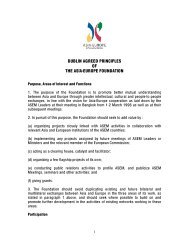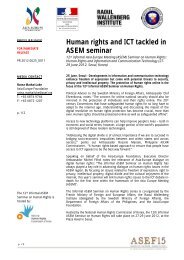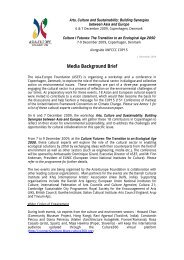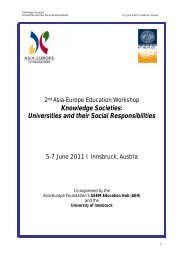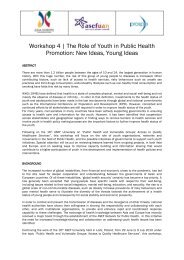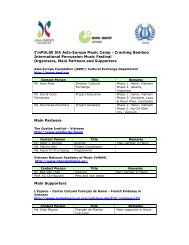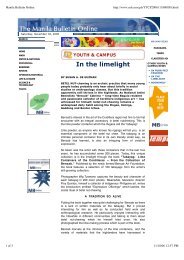Annual Report 2008 - Asia-Europe Foundation
Annual Report 2008 - Asia-Europe Foundation
Annual Report 2008 - Asia-Europe Foundation
You also want an ePaper? Increase the reach of your titles
YUMPU automatically turns print PDFs into web optimized ePapers that Google loves.
The <strong>Asia</strong>-<strong>Europe</strong> <strong>Foundation</strong> (ASEF) advances mutual understanding and<br />
collaboration between the people of <strong>Asia</strong> and <strong>Europe</strong> through intellectual, cultural,<br />
and people-to-people exchanges. These exchanges include conferences, lecture<br />
tours, workshops, seminars and the use of web-based platforms. The major<br />
achievement of ASEF is the establishment of permanent bi-regional networks<br />
focused on areas and issues that help to strengthen <strong>Asia</strong>-<strong>Europe</strong> relations.<br />
Established in February 1997 by the partners of the <strong>Asia</strong>-<strong>Europe</strong> Meeting (ASEM),<br />
ASEF reports to a board of governors representing the ASEM partners. ASEF is the<br />
only permanent physical institution of the ASEM process. Since 1997, the <strong>Foundation</strong><br />
has initiated projects engaging some 14,000 individuals from <strong>Asia</strong> and <strong>Europe</strong>. ASEF<br />
works in partnership with other public institutions and civil society actors to ensure<br />
its work is broad-based and balanced among the partner countries.<br />
www.asef.org<br />
The <strong>Asia</strong>-<strong>Europe</strong> Meeting (ASEM) was initiated in 1996 when the ASEM<br />
leaders met in Bangkok, Thailand. ASEM is an informal trans-regional platform<br />
for dialogue and co-operation between the two regions and has arisen out of a<br />
mutual recognition that the relationship between <strong>Asia</strong> and <strong>Europe</strong> needed to be<br />
strengthened in light of the challenges and opportunities of the 21st century.<br />
The ASEM process is based on an equal partnership and its activities are grouped<br />
into three pillars: political, economic and socio-cultural. It brings together Austria,<br />
Belgium, Brunei, Bulgaria, Cambodia, China, Cyprus, Czech Republic, Denmark,<br />
Estonia, Finland, France, Germany, Greece, Hungary, India, Indonesia, Ireland, Italy,<br />
Japan, Korea, Laos, Latvia, Lithuania, Luxembourg, Malaysia, Malta, Mongolia,<br />
Myanmar, the Netherlands, Pakistan, the Philippines, Poland, Portugal, Romania,<br />
Singapore, Slovakia, Slovenia, Spain, Sweden, Thailand, United Kingdom, Vietnam,<br />
the <strong>Europe</strong>an Commission and the ASEAN Secretariat.<br />
ASEM holds a Summit every two years, alternately in <strong>Asia</strong> and in <strong>Europe</strong>. This is<br />
the highest level of decision-making in the process. Besides the attendance of<br />
the Head of States, the Summit also features accompanying Ministers, the Head<br />
of the <strong>Europe</strong>an Commission and other stakeholders. Apart from the Summit<br />
meetings, the ASEM process is carried forward through a series of Ministerial<br />
and working-level meetings, as well as a number of activities arising from it.<br />
www.aseminfoboard.org<br />
COVER DESIGN CONCEPT The cover design features three interlocking rings which form<br />
‘08’ and encapsulate ASEF’s slogan. It uses four bold colours – red, blue, green and<br />
yellow, a vibrant palette which is a signature part of the ASEF’s visual identity. Through<br />
the use of the watercolouring effect, the four colours merge and disperse to create a vivid<br />
spectrum of colours representing the diversity and dynamism of ASEF.<br />
Message from Chairman 01<br />
The Board of Governors<br />
Message from<br />
02<br />
Executive Director<br />
The ASEF Team<br />
03<br />
Executive Office 04<br />
Cultural Exchange 05<br />
Intellectual Exchange 06<br />
People-to-People Exchange 07<br />
Public Affairs 08<br />
Finance and Administration 09<br />
Focus Area ASEM 7 10<br />
Projects and Events 12<br />
Publications and Websites<br />
Financial Information<br />
31<br />
Summary of Expenditure 38<br />
Sources of Funding for Projects 39<br />
Financial Contributions 40<br />
Partners and Sponsors 41<br />
Indeed, ASEF’s achievements since its founding<br />
in 1997 have been remarkable for such a small<br />
organisation. It has conducted over 400 projects<br />
during the course of its existence, resulting in<br />
14,000 or so alumni from different walks of<br />
life from both regions. Through this, ASEF has<br />
created sustainable bi-regional networks over a<br />
cross-section of society.<br />
ASEF operates in the context of a growing<br />
strategic relationship between <strong>Asia</strong> and <strong>Europe</strong>.<br />
Its work complements that of the <strong>Asia</strong>-<strong>Europe</strong><br />
Meeting process or ASEM, under whose political<br />
aegis ASEF was created. There is a clear nexus<br />
between them, making ASEF a rather unique<br />
conduit between civil society and policymakers,<br />
while adding considerable value to ASEM<br />
through its activities. This is best manifested<br />
by the numerous activities ASEF undertakes,<br />
directly or indirectly, in support of ASEM. The<br />
best example in <strong>2008</strong>, but by no means the<br />
only one, was the 7th ASEM Summit (ASEM7)<br />
in Beijing in October <strong>2008</strong>. On that occasion,<br />
ASEF, in co-operation with host China, organised<br />
a series of activities that engaged a crosssection<br />
of civil society constituencies covering<br />
areas such as international relations, the<br />
economy, culture, media developments and the<br />
environment. In their declaration at ASEM7, the<br />
leaders recognised “the value of ASEF’s flagship<br />
programmes in furthering the priorities, and<br />
enhancing the visibility of ASEM.”<br />
During the year, there were several significant<br />
organisational developments that are worth<br />
highlighting. First, the Executive Committee of<br />
the Board of Governors of ASEF was expanded in<br />
<strong>2008</strong> from 10 to 12 Governors by the inclusion<br />
of an <strong>Asia</strong>n and <strong>Europe</strong>an member each. This is<br />
a response to the increase in recent years in the<br />
membership of ASEM, which now stands at 45.<br />
Second, and very important, there was a<br />
handover in leadership at ASEF. As of 1<br />
November <strong>2008</strong>, Ambassador Dominique Girard<br />
of France took over as Executive Director for a<br />
four-year term, from Ambassador Wonil Cho of<br />
Korea. This followed a changeover earlier in the<br />
year in Deputy Executive Directors which saw<br />
Ambassador Nguyen Quoc Khanh of Vietnam<br />
take over from Mr Bertrand Fort of France.<br />
I would like to place on record the gratitude<br />
of the Board of Governors to Ambassador<br />
Cho and Mr Fort for their dedication and their<br />
invaluable contributions to ASEF. At the same<br />
time, we welcome Ambassador Girard and<br />
Ambassador Khanh to the ASEF family. I look<br />
forward to working with them, both of whom are<br />
distinguished diplomats with vast experience<br />
that will be assets to ASEF’s evolution. I<br />
observed with satisfaction that the transfer of<br />
the Executive Directorship from Ambassador Cho<br />
to Ambassador Girard was well-prepared and<br />
professionally executed.<br />
Looking ahead, ASEF operates in an increasingly<br />
complex and challenging global setting. It must<br />
remain relevant and responsive to this dynamic<br />
environment, while remaining true to its mission<br />
and inherent strengths. The ASEM7 Summit<br />
was inevitably preoccupied by the financial and<br />
economic crisis, which is global in scope and<br />
has affected <strong>Asia</strong> and <strong>Europe</strong> unexpectedly<br />
severely. The crisis is likely to be with us for<br />
some time to come, with the attendant social<br />
implications. ASEF is well-positioned to mobilise<br />
its civil society networks, in order to facilitate a<br />
bi-regional dialogue to address the wide-ranging<br />
impact of the crisis. The new leadership of ASEF<br />
is fully aware of the challenges and dangers of<br />
the global economic crisis and has started to<br />
work on projects to focus on various aspects<br />
of the crisis. It is our obligation to mobilize the<br />
outstanding representatives of civil society,<br />
as well as policymakers to help to understand<br />
the rapidly changing phenomena of the crisis.<br />
The inevitable duty of ASEF is to give priority in<br />
its intellectual work to the possible social and<br />
political consequences of the increasing global<br />
uncertainties and imbalances. At the same time,<br />
ASEF needs to continue to maintain on its radar<br />
scope other pressing global issues such as<br />
climate change and inter-cultural dialogue where<br />
it has developed an excellent track record.<br />
Conversely, it should be recognised that the<br />
important long-term work ASEF does is only<br />
possible with the support of ASEM partners,<br />
and that the current economic difficulties may<br />
have implications for the financial resources<br />
the <strong>Foundation</strong> can obtain to do its work. Some<br />
perspective is necessary here especially since<br />
ASEF has a track record of delivering high-quality<br />
results in a cost-effective manner. Its approved<br />
Chairman’s Message<br />
budget for 2009 of less than SGD$9 million or<br />
4.5 million euros, is modest by any standard,<br />
especially when seen against the quality of its<br />
programmes. It is necessary therefore for ASEF<br />
and its ASEM stakeholders to work together to<br />
ensure that the necessary financial contributions<br />
are maintained.<br />
Notwithstanding the challenges ahead, ASEF<br />
has developed various competencies over the<br />
years, which are increasingly relevant in an<br />
interconnected world in need of multilateral and<br />
multi-stakeholder solutions to various issues.<br />
With its emphasis on constructive dialogue,<br />
backed by an impressive and growing list of<br />
alumni and partner institutions, ASEF is wellplaced<br />
to enhance its already significant role<br />
at the heart of <strong>Asia</strong>-<strong>Europe</strong> relations. I am<br />
confident that ASEF and its energetic staff will<br />
continue to make the most of the opportunities<br />
in the years ahead.<br />
Ambassador András Balogh<br />
Chair of the Board of Governors for 2009<br />
01



